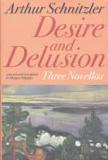Freud Was a Fan
The vagaries of Arthur Schnitzler’s reputation in the English-speaking world have been curious. Often praised but little read, best known for filmed versions of his work, from Max Ophuls’s marvelous “La Ronde” (1950) to Stanley Kubrick’s dreadful “Eyes Wide Shut” (1999), Dr. Schnitzler (1862-1931) gave up the practice of medicine early on, but kept his sharp, unsparing clinical eye. Popular mythology likes to see Vienna before and after the turn of the last century as a frothy operetta, full of elegance, charm and decadent sex. But another major Austrian Jewish writer, Hermann Broch (d. 1951), more pointedly described the period as a “values vacuum.” If the Viennese obsessively pursued their pleasures, they also obsessively hastened their own destruction through alcoholism, venereal disease, duels and suicide. And in this death-haunted world of dazzling exteriors and dismal secrets, Schnitzler really knew his way around.
Desire and Delusion presents three long stories, “Flight into Darkness” (1931), “Dying” (1895) and “Fräulein Else” (1926). In this nonchronological order, the novellas go from more to less cerebral, from less to more successful (and widely read). “Flight into Darkness” traces the mental breakdown of Robert, a fortyish, relentlessly self-analytical Viennese bureaucrat (who happens to be, like Schnitzler, a cultivated sexual adventurer and gifted amateur pianist).
Robert is sophisticated enough to recognize the signs of his growing paranoia, as he alternately mocks and hides from others his recurrent fantasies that he murdered his first wife (who died of natural causes) and a recent mistress (who is actually still alive). Robert further resembles Schnitzler in having a deep, loving relationship with his physician-brother Otto, who naturally picks up on the first symptoms (outbursts of irrational anger, etc.); and the brothers engage in a marvelously subtle pas de deux of jesting-but-passionate mutual concern. (Otto himself is not a little overworked and stressed out.) But in the end all their love and intelligence go for naught as Robert’s disease gallops away with him into catastrophe.
The pace of terminal illness quickens in “Dying,” whose misnamed protagonist Felix is suffering from advanced TB. Felix is young, tender and ecstatically in love with Mitzi—until awareness of his approaching death turns him into a monster of self-pity. Mitzi seems to be just another compliant, worshipful and sweet girl as she cries that she cannot live without him; but when Felix makes it clear that despite his fading strength he plans to take her with him, Mitzi violently rejects this chance for an actual Liebestod. Here as elsewhere Schnitzler plays variations on Stendhal’s theme of love as pure egotism. It is a crying shame to have to leave this world with so many pleasures untasted. As the teary old Viennese song says, Es wird a Wein sein,/ und mir werd’n nimmer sein (“there will be a [new] wine, but we shall be no more”). But that poignant feeling is not likely to inspire noble behavior. On the contrary, Felix comes apart at the seams; and it is not a pretty sight.
The last and best-known story, “Fräulein Else,” is a brilliant internal monologue by a dishy, precocious, sensitive (isn’t everyone in Schnitzler’s Vienna?) 19-year-old girl whose vile mother wants her to prostitute herself to the much older Baron von Dorsday to keep her crooked lawyer-husband out of jail. The slimy baron agrees to wire the relatively modest sum of 30,000 crowns, but only if Else will strip in front of him. She tremulously and unhappily agrees, but then she gets a telegram from home upping the ante to 50,000; and now who knows what Dorsday will demand? In the end Else walks naked through a hotel lobby, in front of Dorsday and everyone else, rushes to her room, overdoses on the Viennese drug of choice, Veronal, and loses consciousness (readers should know that the dose she takes, six tablets, will probably not be lethal).
As in his other celebrated stream-of-consciousness monologue, Lieutenant Gustl (1900), Schnitzler splendidly succeeds in evoking the feverish mental ramblings of a trapped wretch. But whereas Gustl is a pathetic, obnoxious boor, Else is basically decent, thoughtful and keen-eyed, done in by the conjunction of an awful family, a vicious society and the throes of adolescence. (She also happens, like Strindberg’s Miss Julie, to have a bad case of PMS.) Sadly, Schnitzler had a close-to-home model for Else, his own daughter Lili, who married an Italian fascist army officer and stabbed herself to death at the age of 18.
The translator, Margaret Schaefer, who did good work with her earlier version of Schitzler’s fiction, Night Games (2001), has performed capably here too. Schnitzler’s style is quiet and restrained, though he liked a shattering climax as much as anyone. Except for some Viennese patois here and there, his omniscient narrators and all-too-confused characters speak a graceful but unremarkable standard German. This can sound a bit flat in English, so Schaefer livens things up with crisp American talk—“sure” for natürlich; “sexy” for raffiniert, etc.) She commits a very occasional clinker, e.g., “the multi-faceted sound of a crowd of people” for das hundertfältige Geraun einer plaudernden und vergnügten Menge; but she is readable, relaxed and on the whole the best guide for English readers to the nondramatic works of the man whom Freud (six years his senior) admired and held in awe as his literary doppelgänger. Vater Freud was wrong about a lot of things, but not about the penetrating vision and muted compassion of his troubled colleague.
This article also appeared in print, under the headline “Freud Was a Fan,” in the December 15, 2003, issue.








